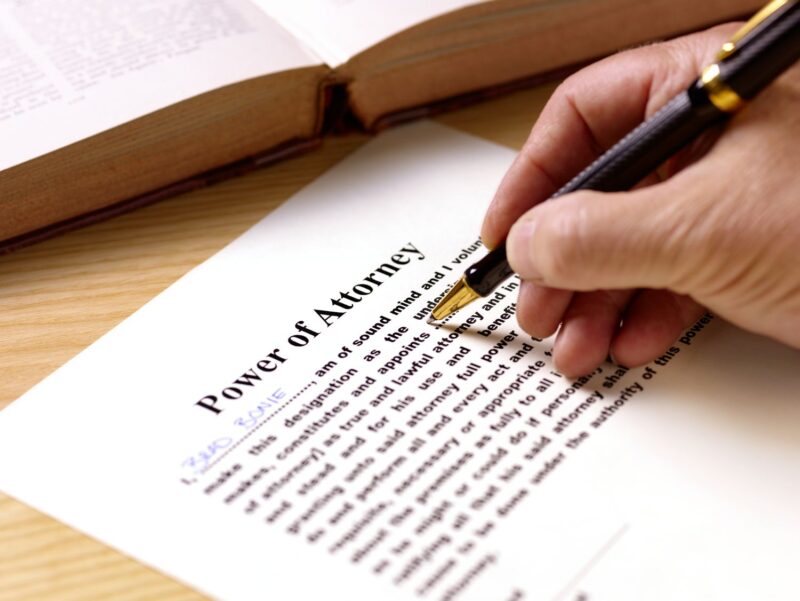Power of Attorney (POA) is a critical legal tool, especially for those who are incapacitated and unable to make decisions for themselves. This tool ensures their affairs, whether personal, financial, or health-related, are managed responsibly.
In this blog post, we’ll dive into the vital steps and considerations involved in obtaining a POA for someone who cannot make decisions due to illness, injury, or other forms of incapacity. It’s more than just a legal procedure; it’s about providing care and ensuring the dignity of your loved one during challenging times.
What is a Power of Attorney (POA)?
Power of Attorney is a legal document that grants one person the authority to make decisions on behalf of another. Primarily used in situations where an individual becomes unable to make informed decisions, it covers a wide range of responsibilities, from managing financial affairs to making crucial healthcare choices.
The essence of Power of Attorney lies in its ability to allow trusted individuals to uphold the best interests of the incapacitated person, ensuring that their welfare and preferences are respected and acted upon, even when they cannot express themselves.
Types of Power of Attorney
There are several types of POAs, each tailored to different needs. The most common include General POA, which covers a broad range of decisions; Special or Limited POA, focused on specific areas or tasks; Durable POA, which remains in effect even after the person becomes incapacitated; and Medical or Healthcare Power of Attorney, designated for healthcare decisions.
Understanding these types is crucial as they dictate the scope and duration of the authority granted. It’s essential to consider which type best suits the needs of the incapacitated person, keeping in mind their current and future circumstances. If Derfel Estate Law is what you’re looking for feel free to contact them.

When is POA Needed?
POA becomes necessary when an individual is no longer capable of making informed decisions due to reasons such as severe illness, disability, mental health issues, or aging. It’s not just about unforeseen events; sometimes, it’s a part of planning for the future. Recognizing the signs of incapacity and understanding when to step in is crucial.
Common scenarios include deteriorating physical health, cognitive impairments like dementia, or after a serious accident. In these situations, having a POA in place ensures that there is someone trusted to make decisions, providing continuity in care and management of affairs.
Choosing the Right Agent
Selecting a trustworthy and responsible agent for Power of Attorney is paramount. This person will be making significant decisions, so they must understand their role and be committed to acting in the best interests of the incapacitated individual.
Look for qualities like honesty, reliability, and the ability to communicate effectively with family members and professionals. It’s also important that the chosen agent has some understanding or willingness to learn about the medical or financial aspects they might need to manage, ensuring they make informed decisions.
Legal Requirements
Creating a POA involves fulfilling certain legal requirements. The document must be clear, detailing the extent of authority granted and under what circumstances it becomes effective. It often requires witnesses and must be notarized to ensure its legality.
Different states or countries might have varying requirements, so it’s important to familiarize yourself with local laws. In some cases, specific forms or wording may be necessary. Ensuring that these legal bases are covered is crucial for the Power of Attorney to be recognized and effective.

Medical POA vs. Financial POA
Understanding the difference between Medical and Financial POAs is crucial. A Medical POA allows the agent to make healthcare decisions, such as treatment options or end-of-life care, while a Financial POA involves managing the financial affairs of the incapacitated person.
Each carries significant responsibilities and requires different knowledge and skills. The agent for a Medical POA should be comfortable making tough healthcare decisions, while a Financial Power of Attorney agent needs to be adept at managing assets, paying bills, and possibly overseeing investments.
Discussing POA with the Incapacitated Person
It’s important to have open and honest communication with the person who will be granting POA, even if they are partially incapacitated. This conversation should be sensitive and respectful, focusing on their wishes and how POA can protect their interests.
It’s an opportunity to discuss who they would trust as their agent and how they envision their care and affairs being handled. This discussion not only ensures that their preferences are understood but also helps in preparing the necessary legal documents accurately reflecting their wishes.
Legal Assistance
Seeking legal advice when creating a Power of Attorney is highly recommended. A lawyer can help navigate the complexities of the legal requirements and ensure that the document is valid and comprehensive.
They can also offer advice on choosing the right type of POA and agent, and guide you through the process of discussing it with your loved one. Consulting an attorney helps avoid common pitfalls and ensures that the POA is tailored to the specific needs and circumstances of the incapacitated person.

Revoking or Amending POA
A POA can be revoked or amended under certain conditions. It’s important to understand when and how this can be done. Usually, the person who granted the POA has the right to revoke it as long as they are mentally competent.
Amendments can be made if circumstances change, such as the chosen agent no longer being able to fulfill their role. Clear steps need to be followed for revocation or amendment, often involving legal documentation and possibly consultation with an attorney to ensure it’s done correctly.
Keeping Records
Maintaining organized records is essential when managing someone’s affairs through POA. This includes keeping copies of the Power of Attorney document, records of decisions made, financial transactions, and medical records.
Proper record-keeping ensures transparency and accountability and can be crucial if there are ever questions or disputes about the decisions made by the agent. It’s also helpful for continuity if the agent changes or if the POA needs to be amended or revoked.
Conclusion
Navigating the process of obtaining and managing a Power of Attorney for an incapacitated person is a significant responsibility. It involves understanding different types of POAs, choosing the right agent, and fulfilling legal requirements. It’s important to approach this with sensitivity, respect, and thorough preparation.
Remember, the goal is to ensure that the incapacitated person’s best interests are always at the forefront. Proactive steps and informed decisions can make a world of difference in providing care and support during challenging times.
Related Posts:
- When to Move from Independent to Assisted Living: A…
- Caring for a Horse's Hooves: Pro Tips for Optimal…
- How to File for Long-Term Disability: Legal Tips for…
- Top 14 Destinations for Medical Treatment in 2024:…
- Is Colorado School of Mines Football Good? - In…
- South African Retirement Living: How Many Retirement…













